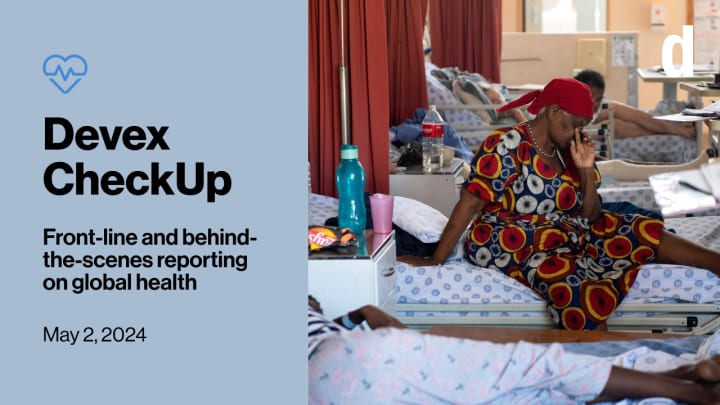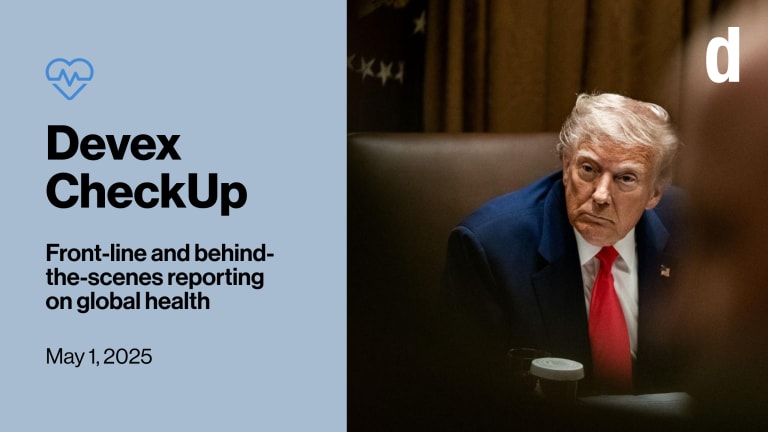Presented by Innovations For Poverty Action and Malaria Consortium

South Africa’s Constitution specifies that everyone who lives there can access health care services. But that guarantee is far from the reality for many, particularly asylum-seekers and refugees.
About 84% of South Africans rely on the public health system. But accessing services can be a nightmare. Some people spend an entire day in a clinic just to be seen by a doctor or to receive medication, according to Paulette Nyeleti Baloyi, advocacy officer for the Johannesburg-based Consortium for Refugees and Migrants in South Africa.
This is a preview of Devex CheckUp
Sign up to this newsletter for exclusive global health news and insider insights, in your inbox every Thursday.
Migrants, asylum-seekers, and refugees face discrimination in accessing these health services. Several laws in the country have strayed from the spirit of the promise to provide health care for everyone. A new bill expected to become law separates asylum-seekers and undocumented migrants from the rest of the population, which could lead to a further denial of services. While foreign nationals are meant to pay the same as South African citizens, some provincial governments have seemingly enforced higher rates, leading to incidents such as the 2017 debacle when a pregnant woman from the Democratic Republic of Congo ended up giving birth on a train station floor after being turned away by at least two hospitals.
NGOs and civil society groups have tried to fill the gaps, but some came with unintended consequences. Médicins Sans Frontières temporarily took over a community clinic in the administrative capital of Tshwane in 2019 in order to ensure health care services could reach undocumented migrants, asylum-seekers, and refugees. But the move just bred resentment among locals and reinforced xenophobia against those the organization was trying to help.
MSF has since shut down its clinic in Tshwane, taking in the lessons learned from the experience — specifically that any program should be inclusive so as not to alienate any particular group, including the local population.
Such discrimination could also have deadly consequences in the case of an outbreak or pandemic, writes my colleague Andrew Green. If certain groups find themselves unable to access health care, or concerned about the treatment they might receive, they’re less likely to seek care — and that could cripple any national attempt to contain or track an epidemic.
Read: The struggle to provide health care to refugees, migrants in South Africa
O positive
I know I’m not alone in dragging my feet when it comes to annual checkups. It’s time-consuming, and the tests aren’t the most pleasant. Anyone reading who’s done a mammogram and pap smear to screen for breast and cervical cancers would know.
But what if cancer could easily be detected through a simple blood test?
That’s what California-based biotechnology company Novelna is working on. Their goal is for one blood test to detect 18 different types of cancer. How? The product they’re developing works to detect low concentrations of proteins, which according to the company can signify the early stages of specific cancers and the tissue in which it originated.
Your next job?
Director, Health Policy & Communication
International Rescue Committee (IRC)
United States | Switzerland
The team’s initial study looked promising. The test identified stage one cancer in 93% of males and 84% of females in a study that involved 440 individuals.But the sample size is small, and they’re aware further tests are needed to prove its efficacy. Given that the basic concept is similar to that blood test famously peddled by Elizabeth Holmes and her disastrous company Theranos, the details may be (and should be) subject to a lot of scrutiny.
Read: Could blood tests make early stage cancer diagnosis accessible?
O negative
Climate change and genetically modified crops have joined forces to cause an unexpected problem: Anemia. Increased carbon dioxide has been found to cause declining levels of iron in several staple crops, and the intense use of chemical fertilizers and pesticides on genetically engineered hybrids also causes a decline in their nutritional content.
That’s contributed to current levels of anemia, which according to the World Health Organization affects almost 30% of women of childbearing age worldwide. This can have devastating consequences, especially for pregnant women, as it increases the risk of complications for both mother and child. Anemia in pregnancy can lead to depression, postpartum hemorrhage, and early labor for the mother — as well as developmental problems for babies.
The government of India tried to address food insecurity by providing over 810 million of its population with 5 kilograms (11 pounds) of free hybrid wheat and rice monthly. But that may have contributed to steadily rising anemia in the country’s pregnant women, Devex contributor Sanket Jain reports.
The Indian government is now trying to address the problem it inadvertently created by offering free blood tests for women in their first trimester to screen and treat them early, and providing iron and folic acid tablets during the second trimester of pregnancy.
Read: Climate crisis and food insecurity are driving anemia in India
One big number
$500 million
—That’s the amount pledged by Saudi Arabia to the Global Polio Eradication Initiative over the next five years during the World Economic Forum special meeting that took place April 28 to 29 in Riyadh. It’s the largest contribution the kingdom has made to polio eradication efforts, and the "largest multiyear pledge by a sovereign donor towards the current GPEI strategy,” according to a news release.
Saudi Arabia and the Bill & Melinda Gates Foundation also announced $3 million and $15 million, respectively, to support the Polio Legacy Challenge, a results-based financing initiative aimed at strengthening the health system in Afghanistan — one of the two remaining countries where polio is endemic — and incentivize its polio eradication efforts.
+ Polio eradication remains a top priority for the Gates Foundation. Devex Pro members can find out how much the foundation gave in the fight to end polio in 2023.
Not yet a Devex Pro member? Start your 15-day free trial today to access all our expert analyses, insider insights, career resources, exclusive events, and more.
General interest
“The way that we do global health is a little outdated, so we have to change the way that we work to focus on what the needs are from partners and what they are telling us.”
— Nidhi Bouri, deputy assistant administrator for global health, USAIDMany major global health initiatives we know today were set up to address specific diseases or needs. Think of the Global Fund to Fight AIDS, Tuberculosis and Malaria, or the U.S. global AIDS initiative PEPFAR. But there has been an increased recognition in recent years of the need for funders to shift from disease-specific support to strengthening health systems more generally to prepare countries for existing and future health challenges, including pandemics and climate change.
Bouri seemed to be alluding to this during a panel on global health equity at the Society for International Development’s annual conference in Washington, D.C., last week, where she said that USAID and many global health funders are “set up in a way that’s somewhat siloed,” and called on advocates to “advocate for us to get investments that are cross-cutting,” my colleague Elissa Miolene reports.
“We do not have a line item for health systems strengthening. We do not have a line item for primary health care. We do have line items for specific diseases, and that's really critical — but it needs to be a both/and, not an either/or,” Bouri said.
What we’re reading
AstraZeneca admits in court documents that its COVID-19 vaccine can cause thrombosis, which is characterized by blood clots and low platelet count, “in very rare cases.” [The Independent]
Two vaccine candidates for H5N1 are in the works as the U.S. deals with an ongoing bird flu outbreak. [NewScientist]
Benin, Liberia, and Sierra Leone rolled out large-scale malaria vaccine programs last week. [Reuters]




